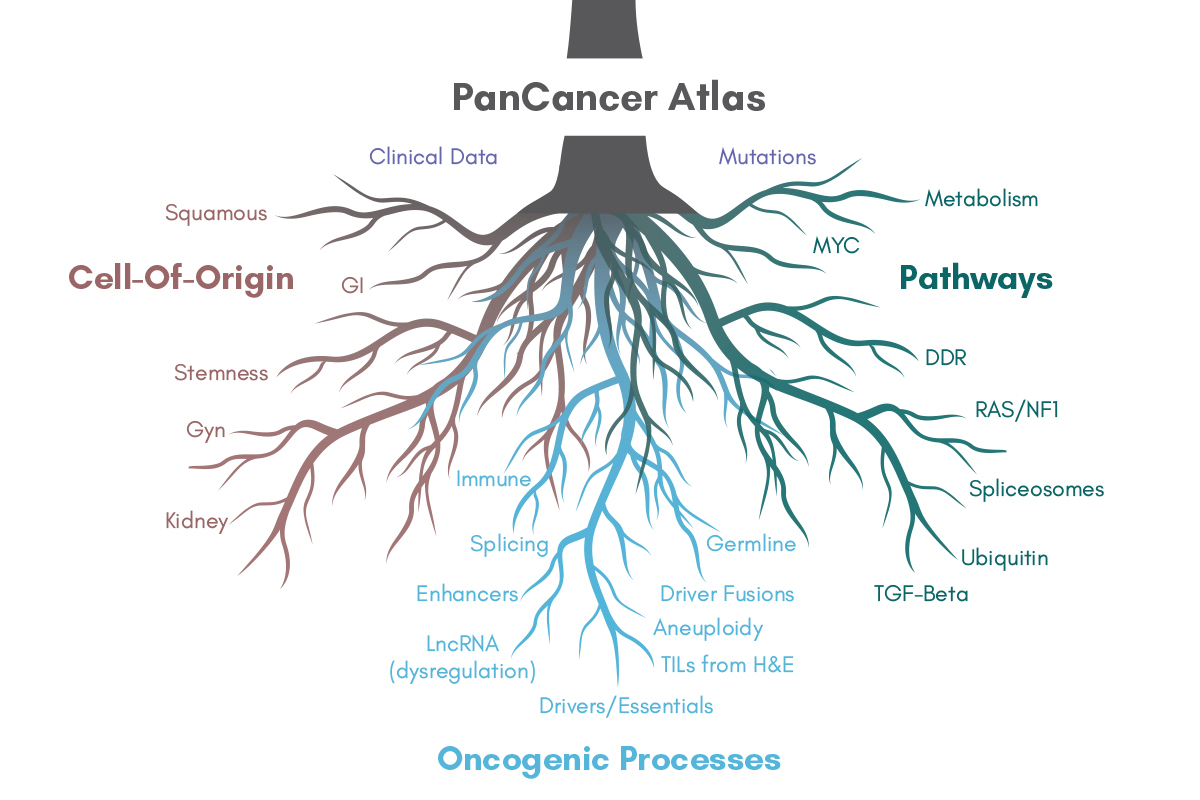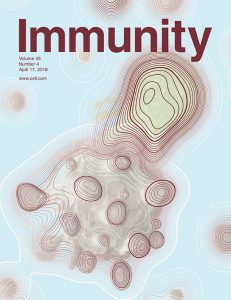ISB’s Computational Teams Play Central Role in Completion of TCGA’s PanCancer Atlas Initiative
 isbscience.org/news/2018/04/05/isb-plays-key-role-in-completion-of-pancancer-atlas-initiative/
isbscience.org/news/2018/04/05/isb-plays-key-role-in-completion-of-pancancer-atlas-initiative/
Novel data analysis tools and resources developed to inspire design of new studies and development of targeted therapies, with potential for far-reaching impact across cancer research
FOR IMMEDIATE RELEASE
SEATTLE – Thursday, April 5, 2018 – The Institute for Systems Biology (ISB) announced today that its computational and bioinformatics teams played a central role in the completion of the PanCancer Atlas Initiative, the final phase of The Cancer Genome Atlas (TCGA). The culmination of this work is being published in 27 papers this week across the Cell Press research journals. ISB researchers played a leading role in eight manuscripts, including The Immune Landscape of Cancer, which was published today in Immunity.
TCGA was established to accelerate our understanding of the molecular basis of cancer, ushering in the development of many novel analytical approaches. ISB-led teams have been associated with the TCGA research network for almost a decade, developing computational methods that have helped researchers map and analyze cancer on a large scale to gain a deeper understanding of its genetic underpinnings and apply it to diagnostic, treatment and prevention strategies.
“We are extremely proud of the key contributions from ISB Professor Ilya Shmulevich’s group to the PanCancer Atlas publications,” said Jim Heath, PhD, president of ISB. “This body of work signals a shift in cancer research. Traditionally, when patients participate in a clinical trial, their data is compared only against the rest of the patients within that trial. However, with the advent of genomic methods, coupled with high-performance cloud computing, the opportunity arises to compare more comprehensive patient datasets across many clinical trials. This means that every patient has the potential to benefit from other patients in a multitude of clinical trials.”
Leveraging data generated from 33 types of cancer through the PanCancer Atlas Initiative, ISB researchers have enabled a deeper understanding of tumorigenesis through development of new computational techniques and tools. While these tools have already been used for the initial analyses reported by the PanCancer Atlas Initiative, they have the potential for broad reaching impact across cancer research.
“I feel very privileged to have been part of TCGA, which through the work of many amazing people produced a cancer dataset that is unprecedented in its scope and scale,” said Shmulevich, PhD. “The PanCancer Atlas Initiative is the first broad demonstration of the usefulness of these data in drawing insights about oncogenic processes that span multiple tumor types and in exploring new therapeutic opportunities. I expect many more studies to be carried out based on this invaluable dataset.”
Highlights of ISB Papers
The Immune Landscape of Cancer

Allison Kudla collaborated with James Eddy to create the cover art featuring the article “The Immune Landscape of Cancer.”
ISB researchers performed an extensive immunogenomic analysis of more than 10,000 tumors comprising the 33 cancer types. Using data from multiple measurement platforms together with domain knowledge in oncology and immunology, the authors identified six immune subtypes that span the different types of tumors and which have distinct distinguishing molecular features that characterize the intratumoral immune response, with significant clinical and therapeutic implications.
“It was a singular experience to collaborate on such a comprehensive dataset with this wide array of leading experts in the analysis and interpretation of immune phenotypes in cancer,” said Vésteinn Thorsson, PhD, ISB senior scientist and the paper’s lead author.
To complement the immune landscape study, ISB researchers collaborated with Sage Bionetworks to build the Cancer Research Institute iAtlas, a web-based resource that allows researchers to study and analyze interactions between tumors and the immune microenvironment. This resource is intended to support future targeted studies focused on advancing the field of immuno-oncology and developing new immune-based therapies.
Genomic and Molecular Landscape of DNA Damage Repair Deficiency Across The Cancer Genome Atlas
This study provides a comprehensive overview of loss-of-function alterations (i.e., somatic mutation, gene deletion, or epigenetic silencing by DNA methylation) in 276 DNA Damage Repair (DDR) genes across the 33 cancer types. ISB researchers performed statistical analyses to identify associations between such DDR alterations and their downstream consequences, such as increased mutational burden or differences in clinical outcomes (e.g. overall survival).
Pathogenic Germline Variants in 10,389 Adult Cancers
This paper provides a catalog of cancer-predisposing germline variants that will be useful for understanding the extent of heritable cancer risk. Whole exome, DNA sequence data from 10,389 non-cancerous samples in TCGA were analyzed. The ISB team was instrumental in facilitating the large-scale variant calling analysis on more than 130 terabytes of raw sequencing data on the ISB Cancer Genomics Cloud – a cloud-based resource developed in the Shmulevich lab. Researchers found that, averaged across 33 cancer types, 8 percent of the 10,389 TCGA cancer patients were carriers of harmful genomic variants. While variants in well-known genes such as BRCA1/2 were re-discovered, there are also potentially novel findings, such as predisposing variants in PALB2 for stomach adenocarcinoma and others.
###
About the Institute for Systems Biology
The Institute for Systems Biology is a nonprofit biomedical research organization based in Seattle. It was founded in 2000 by systems biologist Leroy Hood, immunologist Alan Aderem, and protein chemist Reudi Aebersold. ISB was established on the belief that the conventional models for exploring and funding breakthrough science have not caught up with the real potential of what is possible today. ISB serves as the ultimate environment where scientific collaboration stretches across disciplines and across academic and industrial organizations, where our researchers have the intellectual freedom to challenge the status quo, and where grand visions for breakthroughs in human health inspire a collective drive to achieve the seemingly impossible. Our core values ensure that we always keep our focus on the big ideas that eventually will have the largest impact on human health. ISB is an affiliate of Providence St. Joseph Health, one of the largest not-for-profit health care systems in the United States.
Media contact: Joe Myxter, 425.829.8275, joe.myxter@isbscience.org
To download the official press release, please click here.





